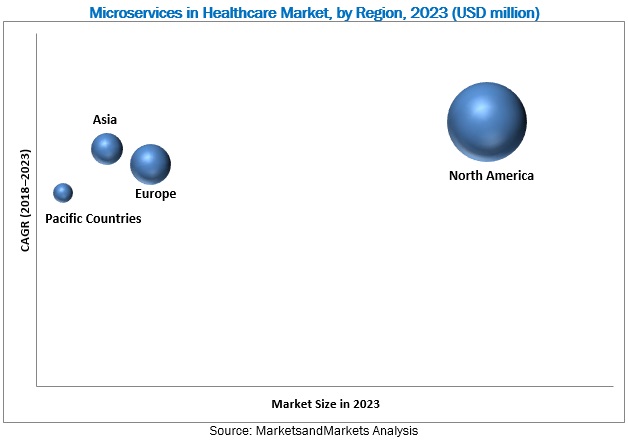
Microservices in Healthcare Market
The report “Microservices in Healthcare Market by Component (Platform, Services (Consulting, Integration, Training, Support, Maintenance)), Delivery (Cloud, Hybrid, Private, On-premise), End User (Health care Provider, Payer, Life Science) – Global Forecast to 2023″, the global microservices market is projected to reach USD 343.3 million by 2023 from the estimated USD 130.7 million in 2018, at a CAGR of 21.3%.
The benefits of microservice architecture, such as their ability to increase overall efficiency and project delivery speed, are the primary factor driving the market growth. However, concerns regarding security and regulatory compliance and the complexity of architecture are expected to hinder the growth of this market.
Request Research Sample Pages:
https://www.marketsandmarkets.com/requestsampleNew.asp?id=119908608
The platform segment is expected to dominate the microservices in healthcare market in 2018.
Based on component, segmented into platforms and services. The services segment is further segmented into consulting services, integration services, and training, support, and maintenance services. The platforms segment is expected to account for the larger share of the microservices market in 2018. This is attributed to the increasing need for cloud microservice architecture for scaling functions at a very granular level for efficient system optimization and organization. Cloud platform microservice architecture also brings a new level of scalability to enterprise applications.
Geographical View in-detailed:
The microservices in healthcare market is segmented into North America, Europe, Asia Pacific, and the Rest of the World (RoW). North America is expected to dominate the market in 2018. The large share of North America in the global microservices market can be attributed to the growing focus on improving the overall efficiency of healthcare organizations and greater product and service availability in the region.
Global Key Leaders:
The microservices in healthcare market is marked by the presence of several big and small players. Prominent players in this market include AWS (US), CA Technologies (US), Microsoft (US), Salesforce (US), Pivotal Software (US), Infosys (India), IBM (US), NGINX (US), Oracle Corporation (US), and Syntel (US).
Download PDF Brochure:
https://www.marketsandmarkets.com/pdfdownloadNew.asp?id=119908608
AWS is one of the leading providers of cloud computing technologies. Since its inception in 2006, the company has focused on delivering the most advanced technology solutions and services to its customers. It provides highly reliable infrastructure with low variable costs that scale with end users’ business requirements. AWS has been strategically focusing on expanding its market reach by using various organic and inorganic strategies. In November 2017, AWS announced the launch of Amazon EKS and AWS Fargate. These offerings complement Amazon ECS and help end users deploy, manage, and scale container workloads on AWS. Furthermore, in December 2017, AWS announced the launch of the AWS EU (Paris) region.
Microsoft is one of the leading providers of microservices. The company caters to the microservices market through the Azure platform. The company’s Service Fabric microservices platform helps enterprises reduce their production time and enable faster application delivery with minimal CAPEX and OPEX. Microsoft focuses on strengthening its R&D efforts to reinvent business productivity, build intelligent cloud platforms, and create personal computing solutions. In June 2018, the company launched Azure Kubernetes Service (AKS) and, in April 2018, the company updated its Service Fabric 6.2. The company also provides its users with economical and convenient products that are integrated with the latest technological solutions and services.


